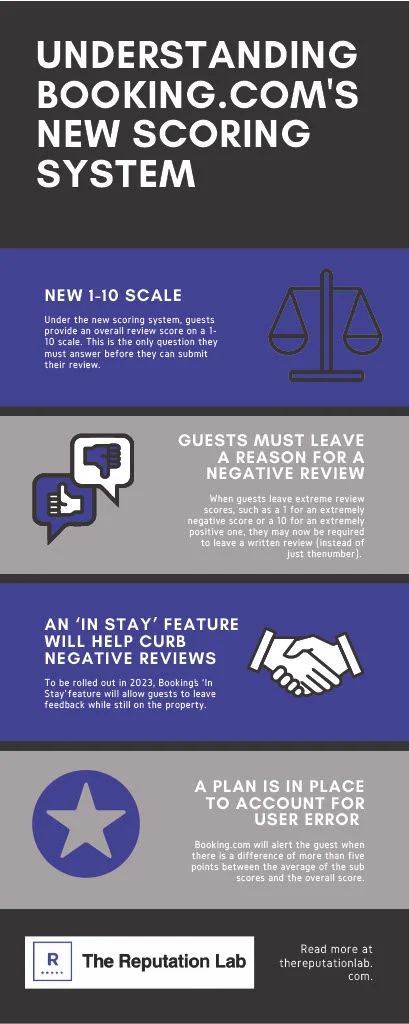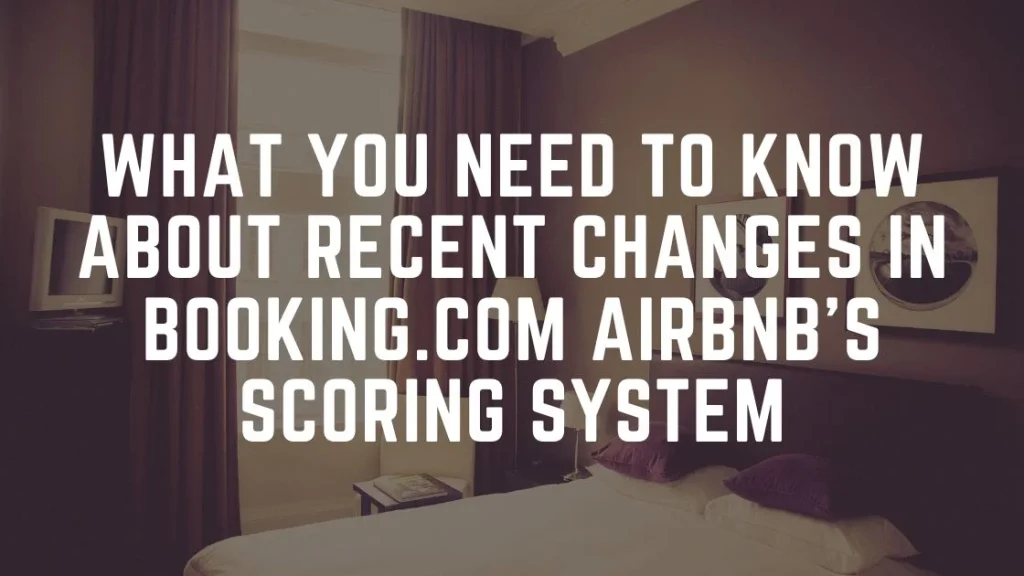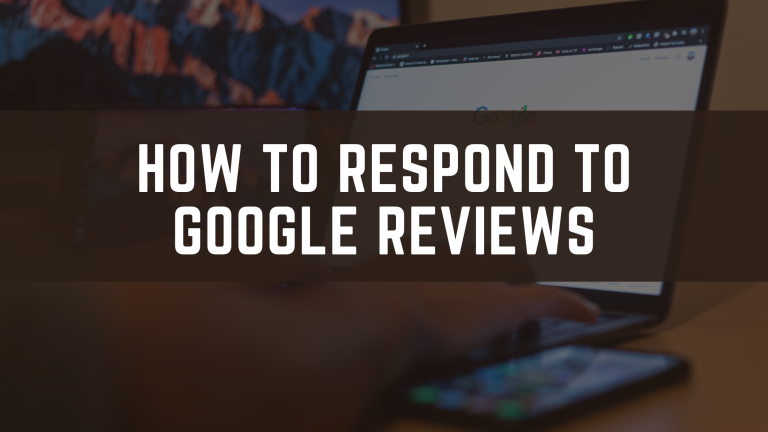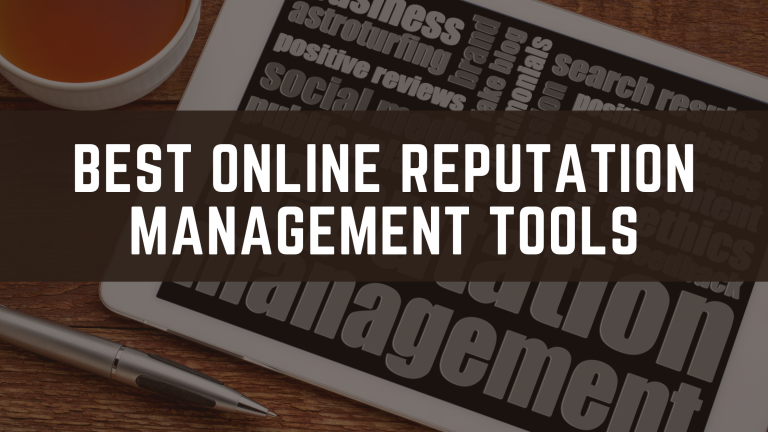In 2022, Booking.com generated 43% of the global review volume. Needless to say, this leading source of online reviews has a very significant impact on overall hospitality scores, and with 95% of travelers reading guest reviews before selecting accommodations, earning high review scores is more important than ever.
Changes to Booking.com Airbnb’s scoring method:
Booking.com Airbnb’s ‘old’ system calculated review scores on the basis of the average across six fixed sub-scores. These subcategories included staff, facilities, cleanliness, comfort, location, and value for money. Known affectionately (or unaffectionately, depending on how well your property fared under it) as the ‘smiley-face’ rating system, the resulting score took the form of a smiley face, frowny face, or one of two choices in-between.
Under the new scoring system, guests provide an overall review score on a 1-10 scale. This is the only question they must answer before they can submit their review. The average of these overall scores becomes their Guest Review Score. The sub-score categories listed above are still present, but optional, and while they provide additional insight, they do not impact the overall score. Additionally, guests can then opt for more personalized subcategories, such as WiFi or breakfast. Again, these will not count toward the Guest Review Score.
Why the change? According to Charlotte Munro, Global Product Marketing Manager at Booking.com, the old system proved too limiting. By collecting the overall score for each review separately from the ratings guests give for the various categories, Booking can now better reflect the experience as a whole. The six categories cannot cover everything a guest might consider when they rate a stay, making the smiley-face method inaccurate or prone to eliciting bias in future potential guests.
Some property owners and managers disagree, arguing that while the numerical system may be more accurate, the smiles expressed both cognitive and emotional channels instead of solely old-school reasoning.
Like it or not, however, change is here, with new and adjusted policies being put into place to ease the transition. Here’s what else is new:
Reviews stay on your page longer:
Booking.com traditionally showcased reviews for the past two years to paint the picture of a property, after which time reviews were archived. During the pandemic, this time period was reduced to only one year, due to temporary closures and lower guest volume. Now, Booking is not archiving reviews until 36 months in an attempt to provide the most accurate picture of a property after what has proven to be an unprecedented several years.
The review platform has also made a commitment to prioritize recent reviews over older ones, happy news for properties that have implemented new features, invested in updates, or restored previously-reduced services following the pandemic.
There are now two instances in which travelers cannot leave a review:
Reviewers cannot submit reviews in the case of a no-show (which accounts for only 2% of flagged Booking.com reviews), or in the case of an overbooked situation. Otherwise, any interaction a guest has with the property makes it fair game for a review.
Guests will now have to give a reason for extreme review scores:
When guests leave extreme review scores, such as a 1 for an extremely negative score or a 10 for an extremely positive one, they will now be required to leave a written review (instead of just the aforementioned number). So far, Booking is only rolling out this feature for extremely negative reviews, but the platform will likely implement this for extremely positive reviews soon as well. In addition, anonymous reviews are no longer allowed on the Booking.com platform.
An ‘in stay’ feature will help curb negative reviews:
To be rolled out at a not-yet-determined date in 2023, Booking’s ‘In Stay’ feature will allow guests to leave feedback while still on the property, and before leaving a review, allowing management to solve any issues that arise that might later turn into negative reviews if left unchecked.
A plan is in place to account for reviewer errors:
It’s a new system, and guests used to the old one may make mistakes. In fact, we’re already seeing this practice in action; for instance, a guest may rave about a hotel, but leave a 1 out of 10 for the score, intending to score it high, not low. To offset this issue, Booking.com will alert the guest when there is a difference of more than five points between the average of the sub-scores and the overall score. This has already drastically reduced the volume of such errors. Only guests can edit their score, not properties, but as another resort, properties can also contact Booking via the Extranet inbox for help.
So, are the changes to the Booking scoring system an improvement, or a detriment? Only time will tell, but for now, the answer, unfortunately, maybe ‘it depends’. Properties that used to get dinged repeatedly on subcategories outside their control, such as location, will welcome the numerical scale that does not take location into consideration (unless the guest did when picking their overall, single-number score), but properties who used to score high on most sub-categories will miss the ‘buffer’ this created in tallying their overall score.
So, now that you know what you’re up against with the new Booking.com scoring system, what can you do to garner higher scores?

Tips to improve review scores:
Reply to them. Almost 95% of travelers read guest reviews. Replying to these reviews is essentially free advertising for your property. It is your chance to shine a spotlight on the positive features of your property, and let future guests k
now when past complaints are no longer relevant (as in the case of construction noise).
Manage guest expectations. Make sure your content online and any related literature reflects the current offerings at your property to avoid unnecessary disappointment or unrealistic expectations.
Keep in mind that many travelers utilize filters when narrowing down their searches. Booking.com’s star rating filter is one of its most popular…further incentive to be rated at 4-5 stars for the most eyes on your property.
Lastly, consider the importance of breakfast, cleanliness, and sustainability. Yes, these three unrelated subjects seem to be at the top of most guests’ minds when booking properties as well as when reviewing them. In fact, 78% of travelers intend to stay in a sustainable property in the coming year.
To learn more about how we can help your hotel, restaurant or other consumer-facing venture create, implement, and manage a reputation management strategy, we invite you to send us an email through our secure contact form or call us at 855-979-6800. For those wishing to manage reviews on their own, our The Reputation Lab platform is an all-in-one dashboard that aggregates reviews, provides sentiment analysis, sends alerts and reporting, manages your local listings, and the platform even provides an AI tool for responding to reviews.




